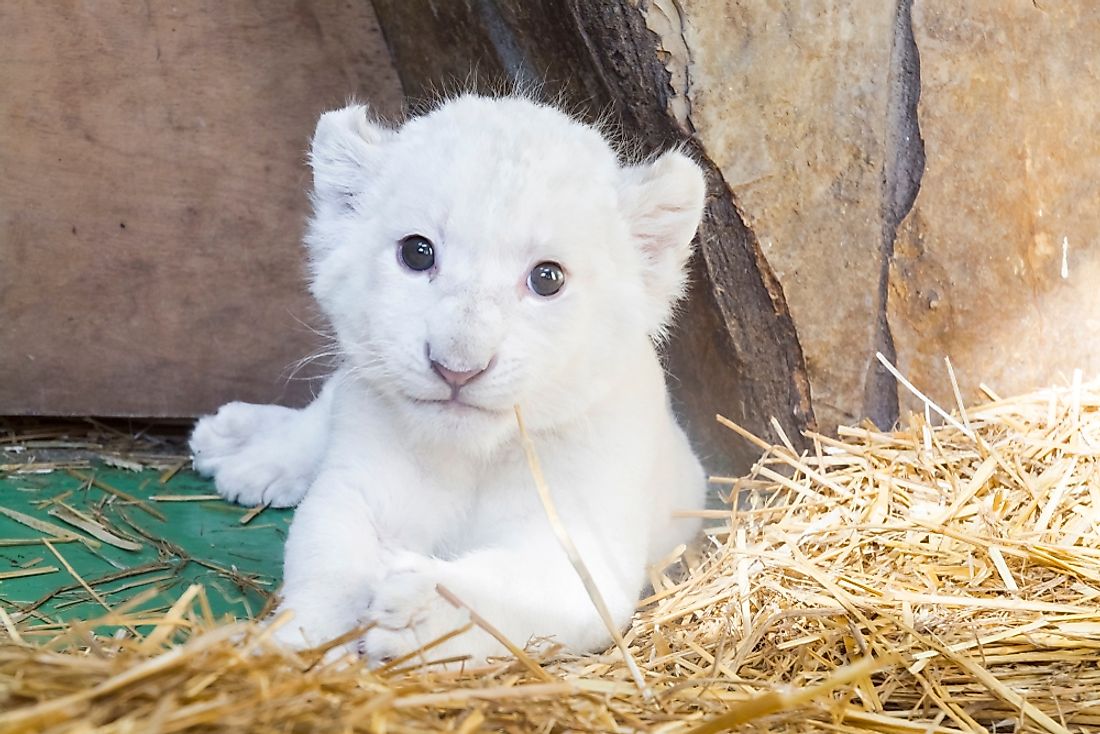What Is A White Lion And Where Are They Found?

The Timbavati area of South Africa holds 5,000 acres of land that are dedicated to the care of white lions. For a long time, it was assumed that white lions are indigenous to this part of the world only. The first white lion was spotted in this region in 1938, but it was not until the 1970s that these animals were brought to public attention. Currently, there are about three prides of white lions in Timbavati and numerous individuals in zoos across the world.
What Is A White Lion?
Lions typically have hazel or golden-brown fur. However, in the case of white lions, the coat is entirely white or a very pale version of the usual fur color. The color of the fur can range anywhere from blonde to near-white. This coloration is inherited from the parents but is a recessive trait meaning that the likelihood of hazel-colored lion being born to hazel-colored lions is higher than that of a white lion. Similarly, breeding white lions can result in hazel-colored offspring.
White Lions Versus Albino Lions
Albinism is the loss of the ability to generate melanin, a skin pigmentation that causes the dark coloration of the skin. White lions are not albinos, although many people are likely to call them "albino lions." One other difference in appearance is that white lions have the usual pigment visible in the eyes, a blue-gray, hazel, green-gray or golden color, whereas albino lions would have a red tone to their eyes.
However, white lions are leucistic, which refers to the reduction of multiple pigmentations and not just melanin. This trait results from a mild mutation of the enzyme that is responsible for the production of skin pigmentations. Severe mutation in this enzyme has been shown to cause albinism. Although albinism in lions exists, they are not the same as the white lions.
Natural Habitat
Hundreds of white lions have been bred across the world, mostly in captivity. The Timbavati region in South Africa is often identified as the native home of the white lion. White lion trophy hunting had almost decimated the populations of this animal, but in 2006 there was an increase in the birth of white lions which has since brought a rise in population. This occurrence showed that the recessive trait that results in white lions was still present in the Timbavati region even after more than a decade of technical extinction. Like other lions, white lions are typically found in the savannah grasslands and hunt just like other lions.
Popular Culture And Conservation Status
The white lion is held in high esteem by the local tribes in Timbavati. In these tribes, the white lion is regarded as a divine animal which reveals that the presence of white lions had been known long before their "discovery" in 1938. This animal is also a famous sight in zoos and circuses globally. Due to the rarity of the white lion, many were brought into captive breeding and enlisted in circuses. Adult white lions were no longer seen in their natural habitat in 1994, leading to the initiative to re-establish white lions in their natural habitat. This initiative was spearheaded by the Global White Lion Protection Trust (WLT), and from 2004 the trust has achieved tremendous milestones, like the official protected status of white lions. The white lion is classified as Vulnerable by the International Union for Conservation of Nature (IUCN).











